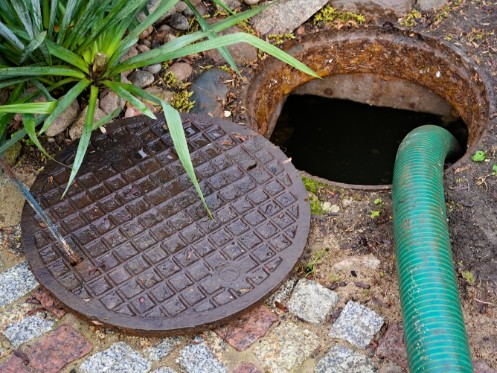You may never feel quite the same about your Vacaville, CA, home after a whole-house backup. There’s nothing like watching raw sewage come back up through your drains and appliances to make you leery of your shower, kitchen sink, washing machine, and tub. The good news is that clogged sewer lines rarely cause backups overnight. More often than not, there are multiple warning signs that alert homeowners to the need for plumbing service before disaster actually strikes. The following are four such signs:
1. Multiple Slow or Blocked Drains
Blocked and slow-moving drains are common plumbing issues. This is especially true in large, bustling households with lots of residents cooking, showering, and using fixtures and appliances on a daily basis. In most cases, this issue is the result of built-up drain debris. Accumulations of soap scum, hair, body oils, grease, and slime slow the movement of wastewater down by limiting the space it can move through. In addition to coating drain catches, covers, and sieves, this debris also clings to the sidewalls of pipes.
If you have a single blocked drain, you may be able to fix it by simply emptying the drain’s mesh, catch, or cover. Adding equal amounts of baking soda and distilled white vinegar to your drain will break down light accumulations of organic matter. You can follow this with hot, running water. However, to prevent the problem from recurring, you should also schedule drain cleaning services at least once a year.
While having a single slow-moving or blocked drain may not be a big deal, having every drain in your home stop working at once is a definite cause for alarm. If you have slow-moving or standing water in your shower pan, laundry basin, or kitchen sink, it’s time to call a plumber. This means that your home’s primary exit route for wastewater is blocked. The only way for wastewater to get out of your plumbing system is by backing up into the building.
2. An Inescapable Sewer Smell
If you suspect that wastewater is no longer moving through your sewer pipe and reaching the municipal sewer main, you might expect to get a whiff or two of the same organic waste that you’ve been flushing down your commodes. Although just as unpleasant as the aroma of human waste, sewer odors might not smell like you expect them to.
Both obnoxious and complex, sewer odors arise from a mixture of gases like methane, hydrogen sulfide, and ammonia that are either collected or created in sewer lines as organic materials decompose. Some might describe sewer gas as smelling like rotten eggs, but others describe it as having a distinct skunk-like odor. One unchanging trait of sewer smells is that they’re impossible to get rid of without first fixing the underlying sewer problem.
You might notice this odor coming from your drains, toilets, or appliances, from your home’s foundation, or from your yard. Pungent and pervasive sewer odors could mean that your sewer line is broken rather than clogged. In some instances, this smell simply means that there’s a dried-out drain that’s preventing a home’s drain waste vent from doing its job. The only way to accurately identify the cause of the problem is by scheduling an inspection. However, if you have both sewer odors and blocked or slow-moving drains, it’s safe to assume that your sewer line is clogged.
3. Bubbling or Gurgling Sounds Coming From Your Toilets
Do your toilets bubble or gurgle just as you’re drifting off to sleep? This is a sign that slow-moving water in your sewer line is finally clearing a blockage. You’re most likely to hear these sounds at night when everyone has gone to bed and no one is adding more wastewater to your plumbing system. Not only are these noises a good sign that it’s time to hire a plumber, but they’re also an indication that wastewater still has room to move through. There’s still time to prevent the costly structural damages and health risks that whole-house backups entail.
Like slow-moving or clogged drains, bubbling and gurgling sounds are particularly concerning when they occur at every drain in your home. A single, noisy commode or drain might indicate a local blockage that only affects one small portion of your plumbing. When all drains raise the alarm at once, the culprit is the single, exterior pipe that carries all waste away from your home and to the municipal sewer system.
Unlike noxious sewer odors and drains that won’t move, bubbling sounds are sometimes easy to miss. For people who aren’t ready for major plumbing repairs, they’re also easy to neglect. Some consumers figure that as long as wastewater is still moving in the right direction, they have plenty of time to schedule inspections and repairs later on.
There are several common causes of sewer line clogs. These include solid or non-degradable materials that have gotten snagged on the rough interior surfaces of pipes, aggressive tree roots and weed systems, and sections of collapsed sewer pipe. While some wastewater might pass through obstructions like these, most solid and semi-solid waste will not. As toilet paper, human waste, and food debris add to these obstructions, increasingly less water gets through. It’s only a matter of time before a backup occurs.
4. Dramatic Changes in the Look or Integrity of Your Yard
Aging pipes develop tiny cracks and other changes in their structural integrity over time. Tree roots and weeds are attracted to these openings. The materials that seep out of them are rich with moisture and nutrients that support their growth. As tree roots and weeds enter these openings and expand them, they create internal blockages and external sewer leaks. If the size of these openings is fairly large or if there are a lot of them, the earth located just over your sewer pipe could become damp, smelly, and sunken.
Another indication that raw sewage is escaping your sewer line is a sudden increase in new growth. Your grass might look especially healthy, or there may be mushrooms flourishing in a dark corner of your yard. If you have bright green patches that suddenly bloom across your lawn, you probably have a sewer line problem.
How to Deal With and Prevent Sewer Line Blockages
In addition to scheduling a drain cleaning once each year, you should have your sewer line cleaned every two years. Hydro-jetting and hydro-steaming services will eliminate buildups of organic debris, break down or push solid and semi-solid items through, and clear out stubborn tree roots and weeds. In between these visits, you can keep your drains moving swiftly and smelling fresh by limiting what you pass through them. Deposit all grease, cooking oils, and rendered fats in the trash, and don’t use your garbage disposal as an alternative garbage can. In the bathroom, keep “flushable” wipes, sanitary napkins, and paper towels out of your commodes.
We’re proud to serve Vacaville, CA, and the surrounding area. We offer heating, cooling, and plumbing services. Our clients can also turn to us for home performance analyses, solar installation, and cutting-edge indoor air quality solutions. To find out more about preventing whole-house backups or to schedule an appointment, contact Cozy Home Services today.



